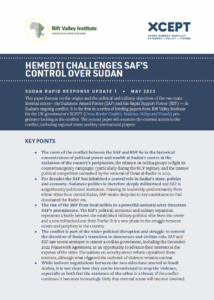This paper focuses on the origins and the political and military objectives of the two main internal actors – the Sudanese Armed Forces (SAF) and the Rapid Support Forces (RSF) — in Sudan’s ongoing conflict. It is the first in a series of briefing papers from Rift Valley Institute for the UK government’s XCEPT (Cross-Border Conflict, Evidence, Policy and Trends) programme looking at the conflict. The second paper will examine the external actors to the conflict, including regional states and key international players.
KEY POINTS
• The roots of the conflict between the SAF and RSF lie in the historical concentration of political power and wealth at Sudan’s centre at the exclusion of the country’s peripheries; the reliance on militia groups to fight its counterinsurgency campaigns (particularly during the NCP regime); and the intense political competition unleashed by the removal of Omar al-Bashir in 2019.
• For decades the SAF has inhabited a central role in Sudan’s state, politics and economy. Sudanese politics is therefore deeply militarized and SAF is a significantly politicized institution. Drawing its leadership predominantly from ethnic elites from central Sudan, SAF retains deep ties to key constituencies that dominated the Bashir era.
• The rise of the RSF from local militia to a powerful national actor threatens SAF’s preeminence. The RSF’s political, economic and military expansion represents a battle between the established military-political elite from the centre and a new militarized one from Darfur. It is a new phase in the struggle between centre and periphery in the country.
• The conflict is part of the wider political disruption and struggle to control the direction of Sudan’s transition to democracy and civilian rule. SAF and RSF saw recent attempts to restore a civilian government, including the December 2022 Framework Agreement, as an opportunity to advance their interests at the expense of the other. Discussions on security sector reform crystalized these tensions, although what triggered the outbreak of violence remains unclear.
• While indirect negotiations between the two sides have started in Saudi Arabia, it is not clear how they can be incentivized to stop the violence, especially as both feel the existence of the other is a threat. If the conflict continues it becomes increasingly likely that external actors will become involved.




